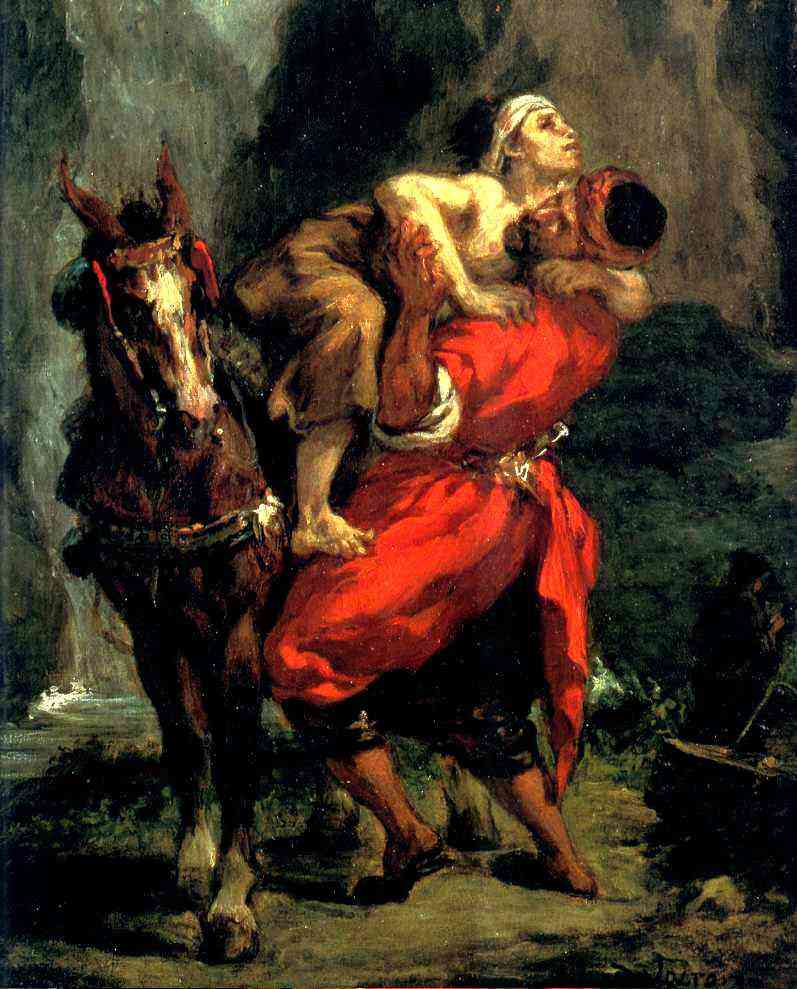
The Greatest Commandment performed by the Good Samaritan.
Just then a lawyer stood up to test Jesus. “Teacher,” he said, “what must I do to inherit eternal life?” He said to him, “What is written in the law? What do you read there?” He answered, “You shall love the Lord your God with all your heart, and with all your soul, and with all your strength, and with all your mind; and your neighbor as yourself.” And he said to him, “You have given the right answer; do this, and you will live.” But wanting to justify himself, he asked Jesus, “And who is my neighbor?” (Luke 10:25-29).
Jesus answered the question, “And who is my neighbor?” with his most well-known parable, the Parable of the Good Samaritan. We know the parable well because, on the face of it at least, it seems a story we could spin ourselves even if we never heard it before:
A man stumbles upon a beaten and comatose stranger in dire need. He goes out of his way to rescue the stranger and sees to the stranger’s care at his own expense. Never does he seek recompense or credit. Now that is a good neighbor.
The parable follows a straightforward and critical exchange between the lawyer and Jesus. In a rare moment of concord between Jesus and the authorities, they agreed on the Greatest Commandment, obedience to which assures eternal life:
You shall love the Lord your God with all your heart, and with all your soul, and with all your strength, and with all your mind; and your neighbor as yourself (Luke 10:27, quoting Deuteronomy 6:5, Leviticus 19:18, and Joshua 22:5).
The lawyer did not ask for a summary of the law but for the way to an outcome: eternal life. So why did the lawyer steer into the weeds by asking, “And who is my neighbor?”
Luke reports that the lawyer approached Jesus in the first place to test him. So their agreement put him in an awkward situation with his colleagues and supporters looking for Jesus to falter. Thus, to this teacher who hung out with unclean outsiders, he asked, “Who is my neighbor?” to embarrass Jesus in front of his friends. If Jesus included the outsiders among the neighbors, he would have betrayed the law. If he excluded them, he would have betrayed his friends.
The Parable of the Good Samaritan validated his outsider friends and kept the heart of the law, the Greatest Commandment. The lawyer and other religious authorities were very concerned to conserve Israelite identity in a pluralistic world. The lawyer and his cronies promoted all kinds of purity standards, rituals, and marks (i.e., circumcision) to distinguish the Israelite identity from others.
But belief in a loving God sufficed to distinguish them. The God of Abraham, Isaac, and Jacob differed from the indifferent gods of neighboring tribes and Roman pagans. Israel’s God uniquely reached out in love, elected the beloved people, freed them, blessed them, and commanded them to love one another.
The Greatest Commandment binds love of God with love of neighbor. Yet, love’s paradox is this: It requires boundaries, then bursts them. Faithful love for my wife requires that I love her like no other, share a unique intimacy and fidelity with her like no other. But what value is that if our love for each other does not draw on God’s love and spill over into loving relationships in church, at work, in the community, indeed, in offering hospitality to strangers?
So it is with God’s love. God chooses the people of Israel, loves them like a bride, but expects the love between them to shine as a light to the world, drawing the world in. Christians respond to that love revealed to us in Christ and made effective for us by the power of the Holy Spirit. Thus, we too share the vocation of God’s chosen to bear witness by our love to the world.
Whatever the lawyer’s motives, then, “Who is my neighbor?” was a very pertinent question. In his answer, Jesus did much more than tell a story of altruistic care. To his Jewish audience he held up a Samaritan neighbor precisely because Jews scorned Samaritans as illegitimate claimants to God’s election. When Jesus asked the lawyer to identify the neighbor to the beaten man, the lawyer could only answer rightly from the heart of the law – “the one who showed mercy”– and thus failed at his trick.
Today in America, depending on the audience, Jesus could answer with the Good Muslim or Evangelical Protestant, the Good Democrat or Republican, the Good Pro-Life or Pro-Choice advocate, you name it. Like the lawyer and his insider friends, all of us have outgroups against whom we define ourselves, and Jesus gets in our faces about that to this day.
Jesus also challenged the notion of purity very explicit in his time, implicit in ours. Ancients thought touching blood or a corpse contaminates one in such a way that one could not come into God’s presence to worship. The way to God and to eternal life with God, required purity. So the priest and Levite passed by.
But for Jesus – and the heart of the Jewish tradition – purity is ultimately a matter of the heart, not ritual practices and social arrangements. “Blessed are the pure in heart, for they will see God” (Matthew 5:8). Being a neighbor is a matter of love, not lineage or lifestyle.
Loving God with all your heart, mind, soul, and strength cannot help spilling into loving your neighbor as yourself. By loving God within the bounds of single-minded devotion, we grow into a love like God’s, a love that welcomes all. That is love’s paradox.
And if we follow that way in hope for eternal life, the only eternal life worth hoping for ventures endlessly beyond the boundaries until we embrace all as neighbors and love them as ourselves.
Blessed are the pure in heart, for they will see God (Matthew 5:8).
Related Posts
Pollution Wars: How the Kindness of Jesus Offended and Healed
Image: “The Good Samaritan,” Eugene Delacroix, 1849, wikimedia commons, Public Domain.


0 Comments